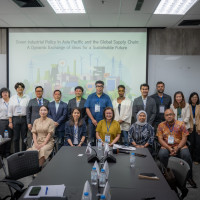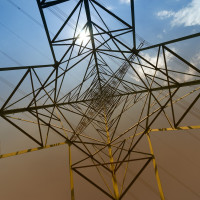Green Industrialisation as Delinking in Times of Green (Neo)colonialism Towards a People-centred Green Industrial Policy
Temas
Regiones
On 8 and 9 October, Montevideo hosted the Uruguay South Initiative, a space aimed at rethinking green industrial policy and international finance from the perspective of the global South. The meeting was sponsored by the Ministry of Industry, Energy, and Mining (MIEM), the Transnational Institute (TNI), and the United Nations System in Uruguay. Hamza Hamouchene shares some of his inputs to the discussion.

A Not-so-new conversation
Robust discussions around Green Industrial Policy (GIP) are taking place within a global and regional context of resurgent theoretical and political debates on development strategies in the framework of the energy transition and decarbonisation of the economy, which conceive (re)industrialisation and state planning as essential public policy tools to overcome the historical blockages of peripheral capitalism.
Amid all the cacophony around Green Industrial Policy (GIP) coming from various spheres in the Global North and Global South (but still primarily in the former), from policymakers and academics to philanthropy and civil society organisations, it has become crucial to:
- Contextualise the discussions to understand all what this “incitation at discourse” is all about and which purposes and material interests it serves.
- Remind various stakeholders and relevant parties that discussions and debates around industrialisation are not new, especially in the context of previous decolonisation and ‘delinking’ experiences in the Global South in the 50s-70s of last century. Perhaps what is new is the “greening” and “decarbonisation” in the context of the climate crisis.
- Be wary of the dangers and risks of reproducing the current status quo in terms of global inequalities, siphoning off value by a tiny global minority and allowing the creation of new sacrifice zones in the name of sustainability.
Clarifying terms
When I was reading the short description of the panel in which I spoke, two things caught my eye.
The first one is the use of the word “competitiveness”, which the Global South should ostensibly strive for. I guess there is no inherent harm in being competitive as such, but I think it’s important to challenge the mainstream thinking that tends to see history only as a competition. In that reading, the global South’s backwardness and poverty are merely the result of its failures; we lost, others won. But to paraphrase the Latin American writer Eduardo Galeano: "the winners happen to have won thanks to our losing". The history of Latin America and other regions’ underdevelopment is an integral part of the history of world capitalism's development.
The second thing that captured my attention and made me think a bit more is a sentence on “ensuring a sovereign insertion in the value chains of strategic materials/minerals”. This seemed to be to be a kind of an oxymoron or a contradiction. How is this insertion going to happen? And hence the word “sovereign” trying to qualify it. But then who does the inserting? For what purpose and for whom will these critical materials be produced? And again, Galeano’s articulations in Open veins of Latín America are on point.
A still relevant framework
So how do we ensure that what is bestowed on us by nature is not doomed to appropriation by imperialism, and how do we make sure that any wish or desire for some economic patriotism is not swiftly neutralised by neo-colonial instruments?
The Burkinabe revolutionary leader Thomas Sankara once said, “He who feeds you, controls you”. And I would add that “he who makes your machines and manufactures what you use every day can enslave you”. In that spirit, I would argue that it is important to revisit the legacy of the dependency-world system theoretical framework and engage with the thinking of towering scholar-activists such as Samir Amin and his ‘delinking’ concept.
Delinking
In the context of globalised monopoly capitalism that is rigged against the Global South, the idea that it can ‘catch up’ is illusory. Instead, Samir Amin argues for ‘delinking’, which means creating national economies to respond to the needs of internal development, not to the demands of corporations and international markets. In that respect, ‘delinking’ involves abolishing dominant forms of private ownership, taking agriculture as central to the economy (food sovereignty), industrialisation, mastery of technology and refusing land and resource grabs in the name of export-oriented ‘development’. It isn’t economic isolation, but rather a rupture with the logic of imperialist domination.
These questions should garner more attention, especially during growing geopolitical and geo-economic tensions characterised by a global turn towards protectionist industrial policy, including in the global North. That has been described by some as the new green cold war between the West and China, which offers opportunities but also risks and threats to countries and peoples in the Global South. The consolidation of a multi-polar world may offer some opportunities for global south nations to embark on attempts at delinking but that would need to involve political and economic regional integration and south-south relations that are not subordinated to the empire.
70 years after the Bandung moment, our challenge is how to reconnect with such an emancipatory project and how to operationalise (green)delinking as a politics of the excluded and dispossessed which is articulated through state power in a warming world. We must show how such a vision can rise to the challenges of articulating and elaborating concrete proposals for just alternatives that challenge extractivist practices and neo-colonial dynamics. Only such an approach can allow for people and countries in the Global South to break the cycle of dependency, to challenge their subordinate insertion into the global economy and to move up the value chain through just and democratic people-centred green industrial policies.


